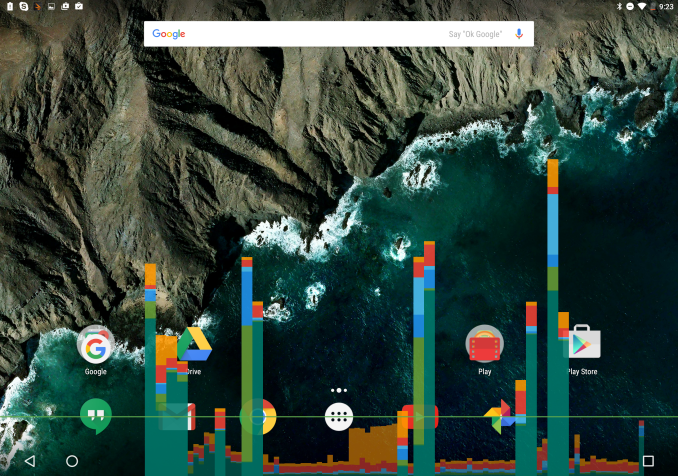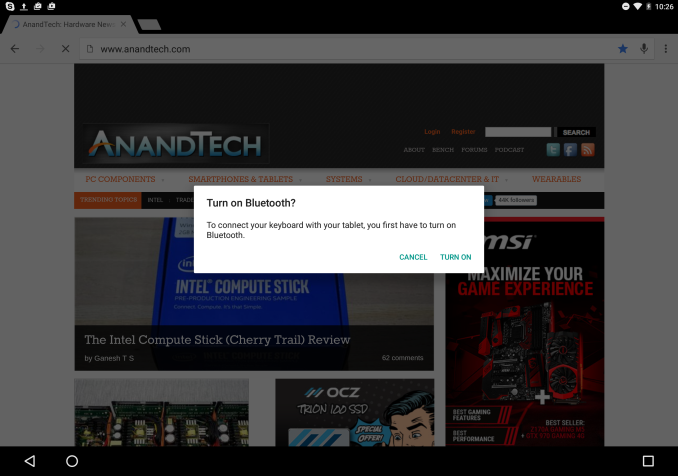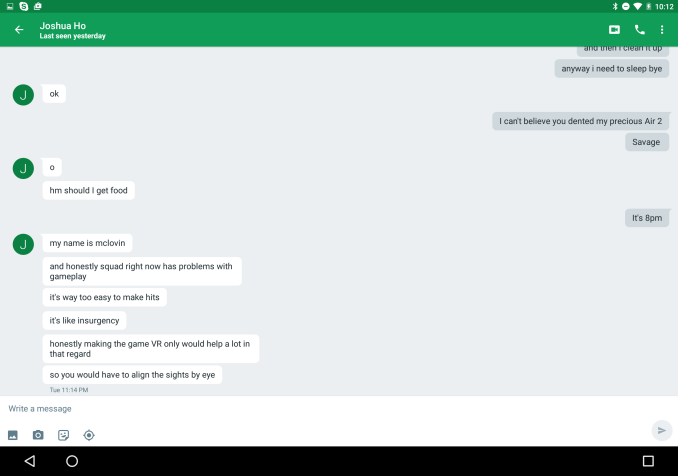The Google Pixel C Review
by Brandon Chester & Joshua Ho on January 25, 2016 8:00 AM ESTSoftware
Google’s Pixel C is the first Android tablet that’s shipping with Android Marshmallow out of the box. Marshmallow isn’t as large of a release as Android Lollipop was, but it includes some notable features like Doze which works to improve standby battery life, Google’s new fingerprint API, and Now on Tap which can grab content from the application you’re in and provide relevant information and search results.
Unfortunately, what Android Marshmallow doesn’t bring is anything significant to improve the experience on Android tablets. Google has made some changes, such as rearranging the software keys on the bottom so they can be used more easily by your thumbs, but they seem like halfhearted attempts when one considers that the issues have existed on Android tablets since the first ones were released, with the exception of the short-lived Honeycomb generation. Marshmallow still doesn’t come with anything to parallel the multitasking gestures that the iPad has had for years, which continues to impede usability and slow down multitasking. There’s no support for split screen applications either, and most of the core applications still act like large versions of their smartphone counterparts.
The Pixel C has a great number of software-related problems that are specific to it as well. Despite how fast Tegra X1 is, and the fact that the SoC is seemingly always using its A57 cores, the interface can be quite janky at times. Normally things perform fine, but both Josh and I have observed random lag and frame drops when doing basic actions like scrolling, opening apps, and bringing down the notification drawer. The worst offender that I've found is pinch to zoom in Chrome. The pinch to zoom implementation on Android has always been quite poor, with the zooming not tracking well with the user's actual pinching motion. In this case, the problem is also that the zoom animation just has an incredibly low frame rate at times, to the point where it's like watching a slide show. It’s honestly shocking to see these issues on a device designed by Google running software designed by Google.
Performance issues are hardly the end of the problems. I was testing the Pixel C during the course of a trip to Europe, and I’ve encountered numerous issues with WiFi connectivity on the Pixel C. They range from an inability to connect to WiFi hotspots because the login page never appears, to issues with the tablet repeatedly disconnecting or failing to connect at all with absolutely no indication as to what the problem is. It’s worth noting that I had my MacBook Pro and the Nexus 5X with me, and neither of them suffered from these issues with the exact same WiFi networks.
Josh has also encountered issues of his own relating to keyboard connectivity. Because it connects over Bluetooth and not a physical link, the Bluetooth link is susceptible to interference from anything else operating on the 2.4GHz band, which includes everything from nearby WiFi to microwave ovens. I'm lucky in that I live in a lower density area, but in his case, there have been several circumstances where the keyboard simply will not maintain a stable connection to the Pixel C. This would have been easy to resolve by using a physical connection like Microsoft and Apple do with their keyboard accessories, but with the rushed circumstances surrounding the Pixel C’s launch as an Android device it may be that it wouldn’t have been possible to integrate OS level support and so the existing Bluetooth keyboard support was used.
Another problem that I am hoping is actually a software issue relates to the touch digitizer. I already mentioned in the display section that it’s very easy to see the grid which is quite annoying, but what poses a serious usability problem is that it simply doesn’t function properly. I have completely lost track of the number of times my swipes and taps were not registered, and very often the display will register a swipe as a tap and bring me into some new screen that I never wanted to open. Sadly, it’s not a stretch to say that the touch input is basically broken. While I thought that this may be an issue unique to my unit, it also exists on Josh’s Pixel C sample as well so it’s clearly not an isolated issue. Google tells me they have a fixed planned, and I hope it ends up working because the issue makes the tablet basically unusable and it needs to be fixed before I can give the Pixel C any sort of recommendation.
I believe that tablets can be used for productivity work, and I make a point of using the tablets I evaluate to write a good portion of their own review. Unfortunately, despite its supposed focus on productivity with its keyboard accessory, I couldn’t safely write any of this on the Pixel C because the software is simply not stable or usable. I have completely lost track of the number of instances where apps would crash, the tablet would lock up for minutes, or the entire operating system would crash and the tablet would reboot. It’s such an unstable experience that I have no idea how it ever shipped in this state, and it seems like Google either didn’t do enough testing or simply ignored the results of testing in order to meet their promised holiday ship date. These issues make it unsafe for me to attempt to write any documents on the Pixel C, as I fear that it will crash without warning and my work will be lost. It’s no secret that Google originally intended for the Pixel C to run a touch-optimized version of Chrome OS which would work with the combination of the touch screen and the keyboard. However the Android build that is currently shipping on the device is not usable for any of the tablet’s intended purposes, and certainly not acceptable for a $500 device.
On top of the issues with this specific Android build, Android itself is simply too far behind the competition as far as functionality and apps are concerned. I have commented on this in several Android tablet reviews, but the fact that Google is shipping their own tablet makes it important to go over it once again. Quite frankly, I still have yet to see a single app that has an UI that is both optimized for tablets and is as fluid as its iPad counterpart, and with the iPad offering multitasking while Windows offers an entire windowing system, there’s absolutely no way for the Pixel C and other Android tablets to be competitive. This applies just as much to Google’s own apps as it does to third party ones, and it’s really not a stretch to say that they behave like you’re using a blown up smartphone. In the past few years both Apple and Microsoft have stepped up their games with their respective tablet OSes go, but it feels like Android has never really advanced past the first generation of tablet OSes, which leaves Android badly lagging the competition.
Statements from Google engineers make it clear that Google has some changes coming to Android in the future to bring features like multitasking, but at this point it seems to me that either nobody Google really understands what a tablet should be, or they are unable to come to a consensus to get something developed. Adding multitasking doesn’t do anything to fix the fundamental issue with application quality, and Google doesn’t want to take the first step in making proper applications so that other developers can follow. Google should not be trying to sell a product based on features that they might decide to add in the future, and with the existing progress of Android on tablets there’s no reason to trust that the necessary features to fix the user experience will ever come.
The fact that Android is in such a poor state on tablets, along with Google’s low quality UIs in their own apps, makes me very skeptical of any chance of the platform being made competitive with iOS and Windows in these respects. This doesn’t just apply to the Pixel C, but the fact that Google has decided to ship a device with such inadequate software for such a high price is very concerning to say the least. At this point, I don’t know if I can really recommend any high end Android tablets in good conscience, because I know they won’t be offering the buyer what they deserve for such a high price. This applies even more so to the Pixel C, which has stability issues that I can’t believe exist on such an expensive tablet with both the hardware and software designed by the same company.













122 Comments
View All Comments
kurkosdr - Monday, January 25, 2016 - link
Split-screen is a problem devs aren't at fault, but Google.jbelkin - Monday, January 25, 2016 - link
Because android only sells when it's subsidized or discounted heavily. That is why android tablets sell fine at $99 but not beyond that. The facts are that android is only fit for low end products - look at Nest now, stops working periodically - an annoyance for a phone or a tablet but deadly when in cold climates when you need the temperature maintained ... but what does Google care* - as long as the tracking info arrives back, the rest - who cares? What, you want your "free" money back?* one reason why google is changing its name tio alphabet, non assiciation with google branding.
Speedfriend - Tuesday, January 26, 2016 - link
Android only fit for low end products? I use iOS and Android products on a daily basis and my Android phone is far more stable than my iPhone, many of my Android apps work better too. And don't get me start on iPhone reliability. The number of hours I have wasted in my life trying to get an iPhone repaired because the touchscreen or fingerprint reader has broken again. We use iPhone as our work phone and the reliability is awful compared to our laptops and PCs.vanilla_gorilla - Tuesday, January 26, 2016 - link
I've got right at 480 iOS devices registered in Air-Watch so my anecdote > your anecdote, and we don't have any of the problems you're describing. The only time an iPhone breaks is when someone drops it or the rash of iPhone 5 we had years ago with the battery issue (for which Apple had a replacement program).fastfreddy68 - Wednesday, March 29, 2017 - link
jbelkin I read your stupidity and cant hold back . Tablets dont sell much because the "niche" they had is gone. Phablets replaced it. Apple six plus is a direct result of the popularity of Samsungs NOTE 4 and f,,,, Android. The Google pixel isnt sold to the poor Rube it cost more then some Iphones.Obviously you are some FANBOY. I'll put my LG V20 up against your Iphone any day.People like Android because of the creativity it allows.
NFC and Waterproofing a direct result of Androids popularity. Claiming Android is only for the poor is so 5 years ago. Maybe instead of buying another Apple product you should buy a clue.!
extide - Monday, January 25, 2016 - link
While I agree the Asian desire for CORESSSSSSS is a bit off, I don't think it really has anything to do with it. Ultimately most people don't care what processor is in the tablet. They care is it slow/crappy? If not, its ok.The software ecosystem, on the other hand, is the big deal. Android is well known for not having many good tablet focused apps. That is a much bigger issue than the cpu and stuff. I mean obviously this thing has great build quality, that's not holding it back.
easp - Monday, January 25, 2016 - link
The lack of good Android tablet software is a problem, but the fact that the Android tablet and phone market is dominated by SoCs with too many cores and too little single-thread performance is a big problem.I don't think its fair to place blame solely at the feet of asian customers. Plenty of spec-obsessed western customers have taken the bait too.
The poor single core performance means that javascript web apps are slow, because Javascript engines are single threaded.
jbelkin - Monday, January 25, 2016 - link
it does matter. high spec high cost android tablets do not sell - just like $1,500 chromebooks or WIN PC's. The max price for an android tablet is $99 and $299 for a chromebook.johnnyzleong - Monday, January 25, 2016 - link
Wow,"The Google ecosystem is focused on ignorant third-world consumers that think more cores are somehow better than faster individual cores."
Holding a iPad makes you feel so good isn't it?
McDuncun - Tuesday, January 26, 2016 - link
That`s the problem man, the Apple Market is so heavily condensed... Not with rational people or a well rounded product line but with the smug bastardized self righteous fumes that all Apple owners exude from their well bleached orifices. Stigmas are there for a reason and yes I can be petty and still make a good argument.